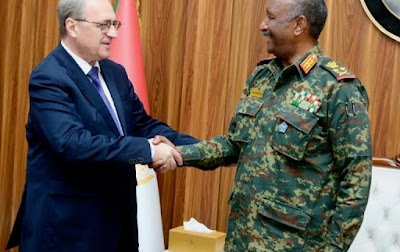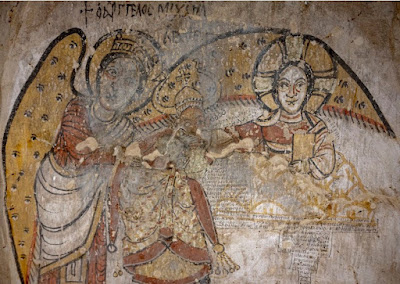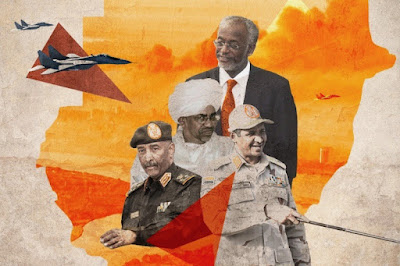Dated Wed, 29 May 2024 - here is a full copy, plus two related reports:
Sudan general confirms Red Sea base deal with Russia, strengthens ties with Iran
Chairman of Sudan's Transitional Sovereignty Council Lt Gen Abdelfattah El Burhan meets the Russian Foreign Affairs Minister Sergey Lavrov in Khartoum, February 9, 2023 (Sudan's Transitional Sovereignty Council)
Lt Gen Yasir El Atta, deputy Commander-in-Chief of the Sudanese Armed Forces (SAF), states in a recent interview with Al Hadath News last Saturday, that Lt Gen Abdelfattah El Burhan, Commander-in-Chief of SAF, signed agreements with Russia for a naval base. El Atta apologised to the Sudanese people for military delays in Khartoum. Sudan and Iran are also strengthening bilateral cooperation following resumed diplomatic relations.
El Atta says that El Burhan will sign agreements with Russia soon. He states that Russia asked for a “supply point” on the Red Sea in exchange for supplying SAF with weapons and ammunition. “It is not a shame to give a military base to any country on the Red Sea with which we have brought together economic partnerships.”
In the same interview, for the first time, El Atta apologised to the Sudanese people, saying, “We apologise to the Sudanese people for any failure and we bear what is happening with all responsibility.”
Acknowledging the army’s delay in recovering a number of areas in Khartoum, “We were late in recovering Bahri and Khartoum for further preparation, but we are currently ready… We have 12 battalions of popular resistance made up of various backgrounds of the political spectrum,” in reference to SAF and its many militias under it. He mentioned that the Rapid Support Forces (RSF) “wreaked havoc” in the areas left by the SAF. The SAF have been gaining victories in Omdurman since the start of the year, in part due to weapon and drone shipments from Iran.
Warm sea port
The Russian government have been attempting to establish warm seaports globally and specifically the Red Sea. In February 2023, Sudan via El Burhan was ready to offer a Red Sea port to Russia in exchange for arms and other considerations. However, the war broke out in April between SAF and the RSF, putting the deal was put on hold indefinitely.
The previous 2021 deal, allowed Russia to keep up to four navy ships in the Red Sea, including nuclear powered ones. The agreement can be automatically extended for 10-year periods if none of the parties objected. Radio Dabanga cannot confirm whether these agreements still stand today.
Russian newspaper Pravda reports Russia may sign an agreement with the SAF for a weapons exchange to support a Russian logistics hub in Port Sudan on the Red Sea.
Growing geopolitical tensions
Yesterday, the American magazine Newsweek warned the US of what it described as a new threat to its interests in the Red Sea, represented by Iran’s efforts to control the important waterway and the formation of a new ‘crescent’ that also threatens the interests of Saudi Arabia, Egypt and Israel. The article further states how Iran is seeking to take advantage of the ongoing civil war in order to expand its military presence.
The article examines how El Burhan aimed to align Sudan more closely with the west and remained wary of the Iranian regime. However, due to a lack of western support, has turned to Tehran for the necessary security assistance to combat the RSF. Iran quickly offered military aid in exchange for establishing a naval base on Sudan’s Red Sea coast, which, alongside its Houthi proxy bases in Yemen, would grant Iran significant control over a crucial global waterway.
However, Iran has denied attempting to entice Sudan to allow it to establish a naval base on the strategic Red Sea coast, a day after Sudan’s foreign ministry issued a similar denial. According to the report, Sudan rejected Iran’s offer for fear of angering the USA and Israel. But it is not clear how long Khartoum will be able to withstand Iranian pressure.
Sudan and Iranian foreign diplomats
The Sudan News Agency reports how Sudanese ambassador Hussein Ali, Minister of Foreign Affairs-designate for Iran, met last Saturday, with Iranian acting FA Minister Ali Bagheri, in Tehran. Arriving to convey condolences on behalf of the Sudanese government on the death of Iranian president Ebrahim Raisi, FA Minister Hossein Abdul Lahian, and their peers in a helicopter crash last week.
Bagheri expressed their deep thanks for the support and assistance they found following this painful event from the Sudanese leadership. The two sides held a session of talks on ways to launch cooperation between the two countries in various fields. This comes after the recent resumption of diplomatic relations between Sudan and Iran, the ambassadors seek to contribute pushing relations between the two countries at a rapid pace.
Rent prices skyrocket
As previously reported, residential property rents in Port Sudan have surged to unprecedented levels, according to reports previous Thursday. The soaring rental prices are attributed to the renewed Iranian diplomatic presence in the city. The Iranian embassy has rented 17 apartments in Port Sudan for its staff, driving up demand and costs. Iran has supplied the Sudanese Armed Forces (SAF) with Mohajer-6 drones, which experts believe have bolstered SAF operations in Omdurman.
Iranian Navy destroyer Alborz, currently deployed in the Red Sea (Photo: Taznim news agency)
___________________________
Further Reading
From Sudan Watch - January 11, 2024:
The Maritime Executive - 09 December 2020
Russia Signs Deal With Sudan for Naval Base on the Red Sea - excerpt:
The agreement provides the Russian Navy with access to Port Sudan for a period of 25 years, with automatic renewal every decade thereafter. It may keep up to four naval vessels at a time at the port, including nuclear-powered vessels - an important consideration for Russia's submarine fleet. For logistics, Russian forces have permission to use Sudanese ports and airports to deliver any needed "weapons and equipment" to keep the port running. On-base manning is limited to 300 Russian personnel.
In return, Russia will provide arms and training for Sudan's military, extending a role it already plays in the country. Last year, Russia and Sudan signed a seven-year agreement that provides the Sudanese government with military support, and Russian military advisors have participated in Sudanese public security operations.
Full story: https://maritime-executive.com/article/russia-signs-deal-with-sudan-for-naval-base-on-the-red-sea
The Maritime Executive - 13 December 2017
Russia Moves Forward with Syrian Naval Base - excerpt:
"For Russia, a naval base in Syria . . . is always a place where Russian navy men can take a short rest and hold quick repairs, if necessary. Taking into account that the Mediterranean and Black Sea regions are of strategic importance for world security, Russian forces should stay here indefinitely," said Mikhail Nenashev, chairman of the All-Russian Fleet Support Movement, speaking to Pravda.
The base at Tartus has been under Russian control since 1971, and Russia finalized a 74-year renewal agreement with Syria in January with a 49-year lease followed by a 25-year automatic extension. The enlarged facility will operate outside of Damascus' legal jurisdiction, and Syria will not interfere with any military activities related to its operation. Separately, Russia has also renewed its lease on a military airbase in Western Syria for a period of 50 years.
Original: https://sudanwatch.blogspot.com/2024/01/sudan-janjaweed-rsf-militia-chief.html
___________________________
UPDATE 1 by Sudan Watch Editor
On Wednesday, 12 June 2024 at 16:02 GMT UK:
Report published at Sudan Tribune
Dated Wednesday, 12 June 2024. Here is a full copy:
Russia denies deal for Sudan naval base
ST PETERSBURG, June 12 – Russia’s Deputy Foreign Minister, Mikhail Bogdanov, confirmed today that talks are ongoing with Sudan regarding a potential Russian base on the Red Sea, but denied any concrete agreement has been reached.
“Communication continues, but there are no firm agreements at this time, even between the defence ministries, to my knowledge,” said Bogdanov, who is also the special presidential envoy for the Middle East and Africa.
In 2019, the two countries agreed to build a logistical centre in Port Sudan. However, following a regime change, the transitional government’s military and civilian components decided to delay ratification until after the general elections.
Recently, several pro-military Sudanese commentators urged General Abdel Fattah al-Burhan, the head of the ruling Sovereign Council, to finalize a deal with Russia regarding the naval base without imposing further conditions.
Additionally, Sudan’s Ambassador to Russia, Mohamed Siraj, reaffirmed his country’s commitment to establishing a Russian naval base on the Red Sea. In a June 1 interview with Sputnik, Siraj stated that a formal agreement for a logistical support centre has already been reached between the two nations.
Bogdanov expressed deep concern over the ongoing conflict in Sudan, emphasizing the urgent need for negotiations to end the bloodshed and prevent the country’s collapse.
“The situation threatens Sudan’s territorial integrity. We have consistently called for strengthening and unifying the country, and this can only be achieved through dialogue,” he said.
The diplomat affirmed Russia’s readiness to facilitate talks aimed at a swift resolution to the conflict, stating, “We support the Jeddah negotiations and Saudi Arabia’s mediation efforts, and are prepared to host meetings if requested.”
View original: https://sudantribune.com/article286891/
END







.jpeg)


